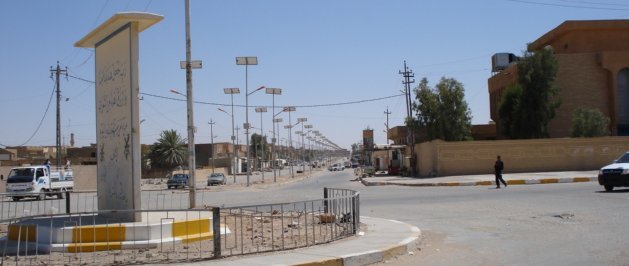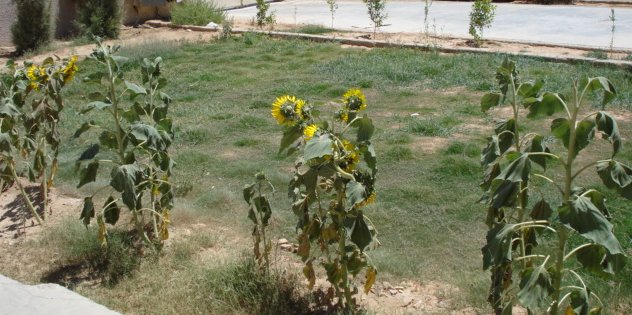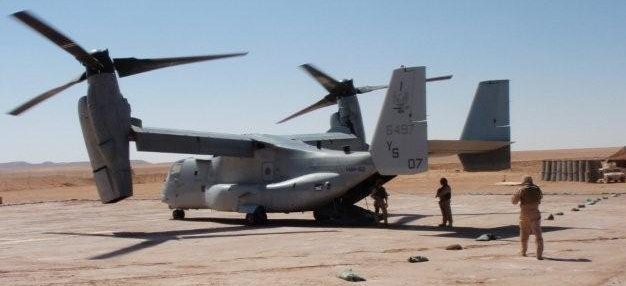Below are solar street lights in Rutbah, a CF project. They work okay, but are not, IMO, aesthetically pleasing.

The Regional Engineer of Rutbah is a modern man with little patience for religious extremists or excessive tribalism. He hates what Saddam Hussein did to his country. He told me that in some towns essentially no new schools were built between the end of the 1970s and the liberation, despite big population growth. As an engineer, he decries the general lack of maintenance. Instead of building infrastructure, Saddam bought expensive weapons systems from the Soviets, French & Chinese (the U.S. supplied only 0.47% of Saddam’s stuff). The fruits of big buying spree litter the deserts around here, MiGs that never fired a shot in anger, tanks that never went anywhere. They decided it was better to abandon them than to fight a real enemy.
It was worst during the sanctions. When Saddam had less money, he spent what he had on palaces, but enough of the past.
Rutbah’s future depends on water. As I mentioned earlier, water is in short supply in the region. There have been some grandiose plans occasionally touted to pipe water over the desert from the Euphrates. It is a long way to pump water and it is all up hill. Beyond that, the Euphrates has been running lower because of dams in Syria and Turkey. In The long pipeline solution is proposed by people who do not understand geography, hydrology, gravity or politics. Besides those things, it is okay.
Below – They have more success with sunflowers than I did.

Fortunately, according to the engineer, the solution to Rutbah’s water woes lies only eighteen kilometers away in Al Dhabaa wadi. He says that twelve wells already exist and that hydrologists have mapped out the groundwater. There is more than enough for a city twice the size of Rutbah. Eighteen kilometers is only around 11 miles. Why, I asked, were people complaining about water when water was so easy to get?
Some of it goes back again to the lost decades of the Saddam tyranny. There are no reliable pipes to bring from the wells across those eighteen kilometers to thirsty Rutbah and much of Rutbah just doesn’t have access to water pipes period. They were never built. Our friends says that Rutbah had good zoning laws, but they were enforced sporadically so that there are some pretty big buildings sitting on some pretty dry land. Well, it is not completely dry. There are no sewage lines either, but what is soaking into the ground is not something anybody wants to drink. Retrofitting whole neighborhoods is extremely costly and time consuming. It may be years and it may be forever before these things are done. Given the ramshackle quality of these buildings, it is probably a better idea to start again from the ground up, but people already occupying these places are less enthusiastic about this sort of solution.
The other reason for the water shortage involved the great bane of Western Iraq – fuel. In this, perhaps the world’s greatest repository of liquid hydrocarbons, fuel for pumps and/or electricity to run them is inconsistent. When the pump goes on and off, it begins to lose siphoning pressure. After a while it is sucking up air or mud. Steady and predicable is what is needed. I don’t know that much about pumps. It doesn’t seem to me that should be such a problem, but the engineer tells me that indeed it is and he seems to know about these things.
In any case, on the one hand, Rutbah’s water problem is solvable and solvable soon in the general case of water for the city. On the other hand, it may be solvable never in the specific situation of some construction that went on w/o the benefit of zoning. Life is tough all over, tougher for some. It is mostly a matter of organization and choices. Most of the choices are simple; some are not easy.

Above is our ride home. Ospreys are good for longer trips. It is still a thrill to ride, but the joy wears off when you hit some turbulence, which always seems to happen on the way to and from Rutbah.
